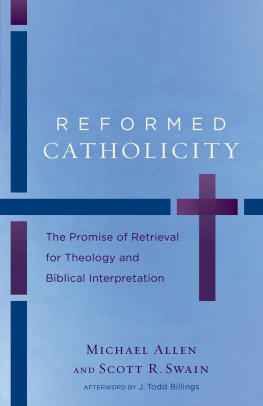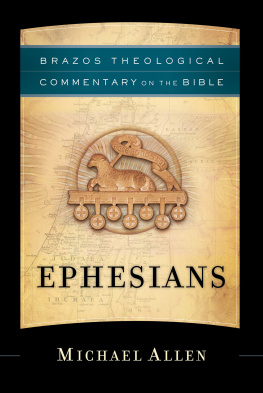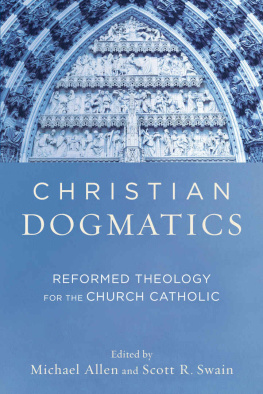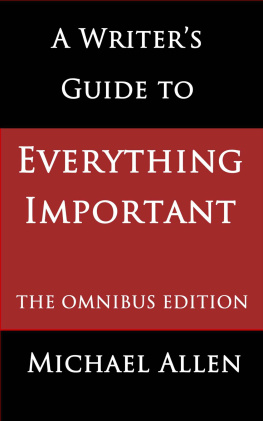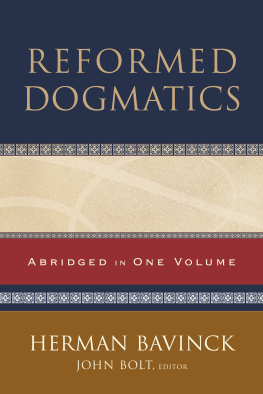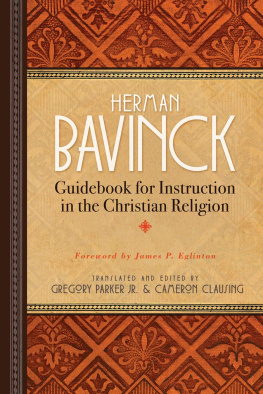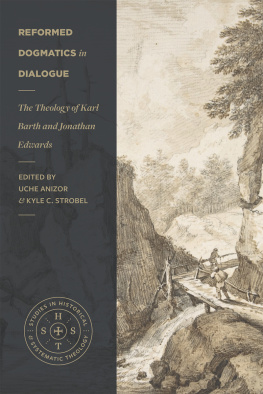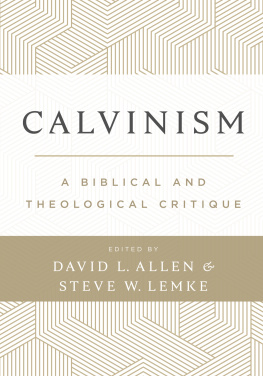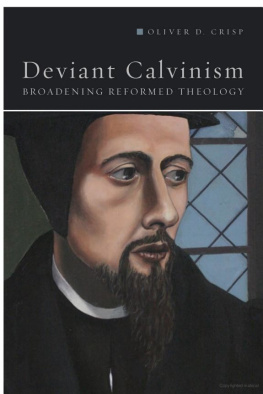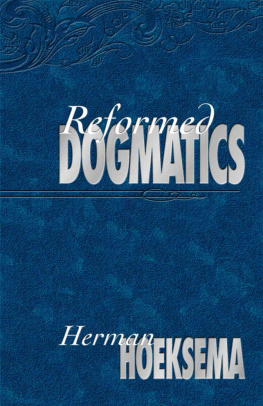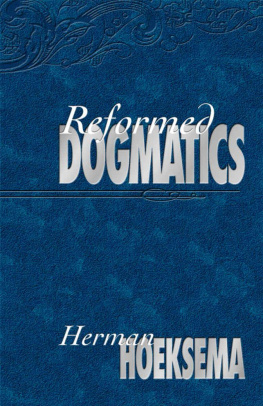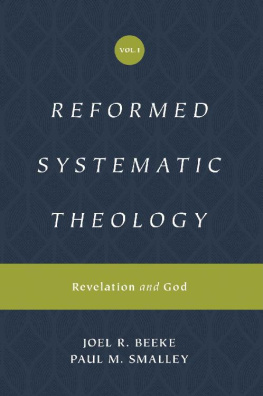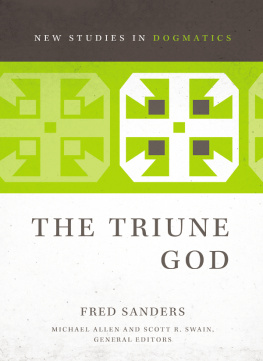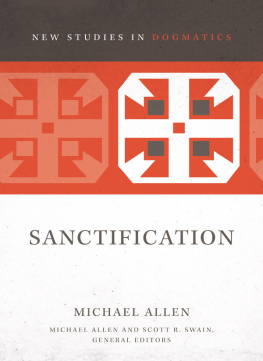
2015 by Michael Allen and Scott R. Swain
Published by Baker Academic
a division of Baker Publishing Group
P.O. Box 6287, Grand Rapids, MI 49516-6287
www . bakeracademic . com
Ebook edition created 2015
All rights reserved. No part of this publication may be reproduced, stored in a retrieval system, or transmitted in any form or by any meansfor example, electronic, photocopy, recordingwithout the prior written permission of the publisher. The only exception is brief quotations in printed reviews.
Library of Congress Cataloging-in-Publication Data is on file at the Library of Congress, Washington, DC.
ISBN 978-1-4412-2041-7
Unless otherwise indicated, Scripture quotations are from The Holy Bible, English Standard Version (ESV), copyright 2001 by Crossway, a publishing ministry of Good News Publishers. Used by permission. All rights reserved. ESV Text Edition: 2007
Scripture quotations labeled NIV are from the Holy Bible, New International Version. NIV. Copyright 1973, 1978, 1984, 2011 by Biblica, Inc. Used by permission of Zondervan. All rights reserved worldwide. www.zondervan.com
To anyone familiar with recent initiatives in Protestant life and thought, it is no surprise that Allen and Swain would coauthor such a stirring summons to embrace the fullness of historic Christian catholicity. What many will find surprising is that their renewal through retrieval manifesto takes the form of rehabilitating the much-abused doctrine of sola Scriptura , by turns defending it from detractors and rescuing it from misguided champions. In their hands, this venerable doctrine resumes its function as a guide for engaging the riches of the churchs historic confession, not as an excuse for ignoring pre-Reformation exegesis. Here is Protestant theology that understands itself, its source, and its context with refreshing clarity.
Fred Sanders , Torrey Honors Institute, Biola University
Reformed Catholicity is a timely and important book. While slim in size, it is weighty in its message, which not only encourages us to recognize how we are all traditioned in our faith but also invites us to enter this lively stream that flows from the Scriptures through the people of God to us. Thankfully, these wise authors avoid the growing forms of naive primitivism becoming popular in some circles while also steering clear of the sectarian theological isolation proposed by others. Instead, they invite readers to embrace Reformed catholicity, a theologically informed approach that humbly responds to the revelation of the Triune God, recognizing the organic connection between Scripture and dogma, consciously drawing upon and in conversation with the wisdom of the historic church in both her universal and particular expressions.
Kelly M. Kapic , Covenant College
A refreshing and encouraging retrieval of the churchs rich tradition is occurring among evangelicals in a manner and depth that would have been well-nigh unimaginable thirty years ago. Reformed Catholicity admirably reflects this engagement and will help Reformed readersand those from other traditionsto embrace ever more deeply the wonder and glory of the blessed Trinity.
Christopher A. Hall , Eastern University
Contents
Cover
Title Page
Copyright Page
Endorsements
Acknowledgments
Introduction: Renewal through Retrieval
1. Learning Theology in the School of Christ: The Principles of Theology and the Promise of Retrieval
2. Retrieving Sola Scriptura , Part One: The Catholic Context of Sola Scriptura
3. Retrieving Sola Scriptura , Part Two: Biblical Traditioning
4. A Ruled Reading Reformed: The Role of the Churchs Confession in Biblical Interpretation
5. In Defense of Proof Texting
Afterword: Rediscovering the Catholic-Reformed Tradition for Today : A Biblical, Christ-Centered Vision for Church Renewal by J. Todd Billings
Index
Notes
Back Cover
Acknowledgments
W e rejoice in the fact that this book is not suggesting a new path but is offering analysis of what we see occurring around us already. So we give thanks for friends and exemplars of Reformed catholicity and of renewal through retrieval. We are delighted to be involved in a number of projects that exemplify, in many ways, the project of Reformed catholicity: specifically, Baker Academics Christian Dogmatics project and Zondervan Academics New Studies in Dogmatics series. We realized, amid these varying ongoing involvements, that it was time to step back and speak programmatically about what such projects assume, namely, a passionate commitment of many to do theology in the context of the catholic and Reformed church. We think there is a serious need for a dogmatic proposal as to why these various recent movements are to be encouraged and how they can best be furthered. We hope that this manifesto does not conclude a conversation, by any means, but acknowledges the progress of developments already taking place and offers some analytical clarity regarding this newfound commitment to a Reformed-catholic ressourcement for the sake of mission and renewal.
We should note those who were willing to read the manuscript (or portions thereof) and offer feedback: John Webster, Todd Billings, Paul Nimmo, Wesley Hill, Jono Linebaugh, Dan Treier, and Kevin Vanhoozer. Their keen eyes and insightful suggestions have reformed the book, no doubt, and any remaining errors are borne by the authors alone. And, of course, we are most delighted that Todd Billings was willing to write the afterword. Todd is an astute historian and as talented a theologian as one will find anywhere. Most importantly, for him those two callings are not separated. Indeed, he embodies the persona of a Reformed catholic, and we are honored that his own proposal concludes this volume and relates it to the life and ministry of local congregations.
We thank our wives, Emily and Leigh, as well as our children for their support in the preparation of this book. We also thank our respective institutions for supporting our research and writing; in particular, Luder Whitlock and Don Sweeting deserve thanks for protecting our time and encouraging this work. The team at Baker Academic has proven remarkable in moving this volume to press with speed and skill; we are thankful for Bob Hosack, Robert Hand, Bryan Dyer, Mason Slater, Jeremy Wells, and Trinity Graeser.
We dedicate this book to Professor John Webster, now of the University of St. Andrews. John has been many things to us: examiner, editor, colleague, and friend. Beyond these various institutional and personal roles, however, he has been a mentor to so many younger theologians in the catholic and Reformed world today. His writings and his institutional service have helped shape a context where Reformed catholicity is a reality and, we believe, one with strong intellectual vitality. For his leadership, example, friendship, and faithfulness, we are most grateful.
Index
African theologies of retrieval,
Allen, Michael,
ambassadors for Christ,
American Patriots Bible ,
American religion, piety of,
Anatolios, Khaled,
Ancient Christian Commentary on Scripture,
ancient-future Christianity,
anointing of Christ,
apostles,
Apostles Creed,
apostolic deposit,
Aquinas, Thomas. See Thomas Aquinas
Arand, Charles P.,
Athanasius,
Augustine,
Ayres, Lewis,
Bannerman, James,
Barnes, Michel,
Barth, Karl,
Bavinck, Herman,
Bediako, Kwame,
Belgic Confession (1561),
Benedict XVI (pope),
Bernard of Clairvaux,

